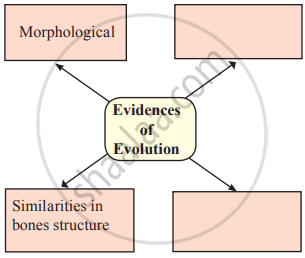Advertisements
Advertisements
Question
Complete the flowchart.

Solution

RELATED QUESTIONS
What are vestigial organs?
(a) Select the homologous structures from the combinations given below:
(i) Forelimbs of whales and bats
(ii) Tuber of potato and sweet potato
(iii) Eyes of octopus and mammals
(iv) Thorns of Bougainvillea and tendrils of Cucurbita
(b) State the kind of evolution they represent.
Explain with an example for the given, how the following provides evidence in favor of evolution in organisms :
Homologous organs
Write the similarity between the wing of a butterfly and the wing of a bat. What do you infer from the above with reference to evolution?
Differentiate between analogy and homology giving one example each of plant and animal respectively.
How analogy and homology considered as an evidence in support of evolution ?
State a reason for the increased population of dark coloured moths coinciding with the loss of lichens (on tree barks) during industrialization period in England.
An example of homologous organs is
Give the importance of fossil in support of organic evolution
Explain with an example for the given, how the following provides evidence in favor of evolution in organisms :
Analogous organs
Select and write analogous structures from the list given below :
1) Wings of butterfly and birds
2) Vertebrate hearts
3) Tendrils of Bougainvillea and Cucurbita
4) Tubers of sweet potato and potato
Out of bacteria, spider, fish and chimpanzee, which organism has a better body design in evolutionary terms? Give reason for your answer.
Wing of an insect and forelimb of a bird are :
(a) analogous organs
(b) analeptic organs
(c) homologous
(d) homophobic organs
The organs P and Q of two animals have different structures but similar functions. On the other hand, the two organs R and S of two other animals have the same basic structure but different functions.
(a) What are the organs like P and Q known as?
(b) Name the organs like P and Q. Also name the animals which have such organs.
(c) What are the organs like R and S called?
(d) Name the organs like R and S. Also name the animals which have such organs.
You have potato, carrot, radish, sweet potato, tomato and ginger bought from the market in your jute bag. Identify two vegetables to represent the correct homologous structures.
(A) Potato and tomato
(B) Carrot and tomato
(C) Potato and sweet potato
(D) Carrot and radish
Vestigial organ ______ present in human body is proof of evolution.
Explain with suitable examples importance of anatomical evidence in evolution.
_______ is a connecting link between Annelida and Arthropoda.
“Appearance of melanised moths post-industrialisation in England is a classic example of evolution by natural selection.” Explain.
The most common types of fossils are ------------------------.
Draw a labelled diagram of T.S. of a leaf showing Kranz anatomy.
Answer the following question:
What are homologous structures? Give an example. Is it necessary that homologous structures always have a common ancestor? Justify your answer.
Find an odd one out.
Enlist the evidences of evolution.
Observe the following images and answer the questions.

- Which evolutionary evidences are indicated in the given picture?
- How are they formed?
- Which method is used to measure their age or their time?
Homologous organs and vestigial organs are examples of ______ type of evidence in evolution.
The fossil remains of Archaeopteryx is a connecting link between ______
Study of fossils is ______.
Which is not a vestigial organ in a man?
The study of fossil evidence of evolution is called ______
Which of the following is used as an atmospheric pollution indicator?
Animal husbandry and plant breeding programmes are the examples of ______.
Give an example for convergent evolution and identify the features towards which they are converging.
Give a scientific reason.
Morphological evidences suggest that dog, sheep and wolf have a common origin.
Explain natural selection with the example of industrial melanism.
Define the term:
Homologous organs
Give a definition of Palaeontology.
